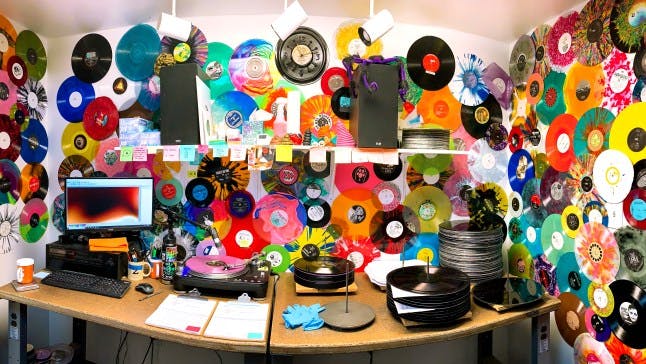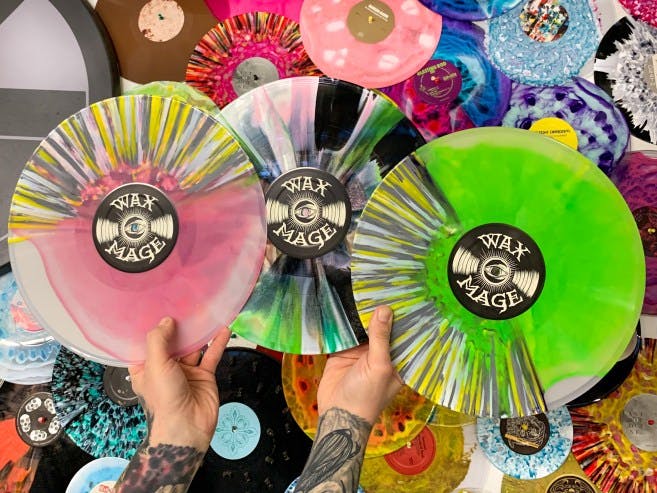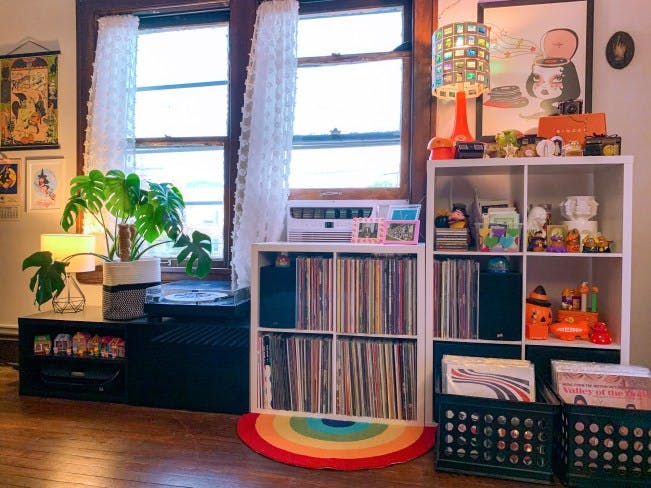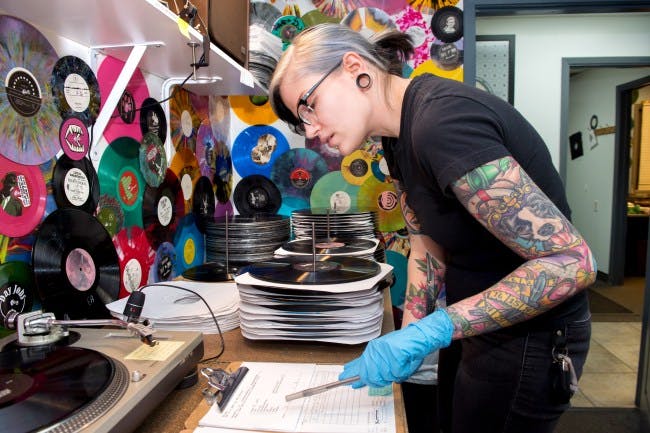Ren Harcar | Quality Assurance, Gotta Groove Records

We have our first double feature! A blog interview, and podcast release to follow (next week) with Ren Harcar, Quality Assurance (QA) at Gotta Groove Records in Cleveland, Ohio. From our first exchange I knew Ren was an immediate sister, she also had great insight to share after three years working in QA. She is currently the only woman in her department as well as on the entire pressing side of the operation.
Gotta Groove operates eight machines, and Ren’s workday is centered around listening to and visually inspecting records, determining which meet their quality standards and which will be scrapped and recycled for audio quality issues and physical defects. She works alongside five press operators and one mechanic, communicating with them on how to adjust the machines to improve quality and minimize scrap.
Outside of work Ren is an illustrator, printmaker and wannabe zinester (her words)! She loves drawing, journaling, thrifting, cooking and baking delicious vegan foods, reading (especially memoirs, nonfiction, and zines), crafting, being out in nature with her dog, taking mini road trips, and decorating her haunted apartment.

How did you get into your industry / What motivated you?
As is true for most of us, music has always been important to me. I grew up on punk and have been involved in DIY communities and spaces since I was a teenager. Though I’ve never been musically inclined myself, I am a visual artist, and the overlap between music and design is a space I’ve gravitated towards and found myself in a lot over the years.
Prior to Gotta Groove, I had been working as a crisis intervention counselor at a mental health agency, and I was feeling pretty burnt out and out of place in a stereotypical office culture. A friend (and press operator at the time) posted on social media that Gotta Groove was hiring for QA and I jumped at the opportunity, even though I was fully expecting not to get a call back.
What is a day in the life like?
I’m one of four QA on first shift at our plant, and depending on what’s running that day, my department supervisor will assign each QA two presses. Once the machines are up and running and I’ve checked in with my press operators, I take the first playable copies from the pressing floor back to my QA room, where I spot check them for any blemishes or defects, weigh them, and double check that the label art and stamper matrix inscriptions are correct and match the job paperwork. I use a small microscope mounted over my turntable to check alignment, trying to catch the possibility of any pitch variation caused by misalignment of a machine’s molds, which can be audibly noticeable with as little as a .6mm difference. I play the lead-ins to check for noise or any tonearm wobble that can cause skipping, then the gaps and lead-outs, and then I get started on listening through each side. Whether I’m continuing on a job from the previous shift or starting a new one, I’ll read through any notes that my coworkers have made, or notes from the test pressings, outlining any issues to look out for and anything else that’s important for me to know about a job, like intentional noise in the masters, or pops on the stampers that the customer has approved.
I set a timer to make sure that I’m back out on the pressing floor every 15 minutes to grab the next stack of records and to check in with my press ops about any problems we’re having. Depending on how things are running, I’ll typically have a stack of 50 or so records to sort through on each trip, while alternating listening to the newest records off each press. As I sort through each stack, I place passing records on a new spindle, A-side to A-side and B-side to B-side, five at a time with a nitrocellulose lacquer in between for flatness.
I fill out paperwork attached to each spindle to keep a running tally of every record I scrap and why, for example: weight, label imperfections, scratches and blemishes, all kinds of noise issues like stitching and nonfill and trimming noise, shaky lead-ins, color purity, center hole distortion, poorly trimmed edges, alignment, and flatness. I take notes on any significant problems and what we’re doing to fix them. If I run into anything weird that I’m not immediately sure about, I check the test pressing we have on file to compare. I pull internal reference copies as a job progresses so we can document exactly how it’s running. If a job has multiple colors or custom variants, I get to kick back for a minute while the press is paused so that the press op can empty the machine’s hopper of one color vinyl and fill it with another.
Once I finish a spindle of good, passing records, I take it to our assembly department where jobs are sleeved, jacketed, shrink-wrapped, stickered, (punched, for large hole 7” records), packed, and prepared for shipment. My coworkers in assembly have the last pairs of eyes on jobs before they make it out the door, and they double check my work. Depending on order quantities and how smoothly things are going on the pressing floor, I’ll usually work on 2-5 different jobs per shift. Before the pandemic, the very end of my day would be spent checking in with my roomie on second shift about how the day went and any issues to be aware of for the night ahead. Now, with COVID, I leave notes and I’m out the door before the second shift crew arrives.
What has been your favorite / the coolest thing you’ve worked on?
Easily my favorite jobs to work on are those with handmade variants like splatters and elaborate color designs by our very own Wax Mage Records. I’m constantly impressed by how creative our press ops are in designing and testing new variants, and also by the running list of things they’ve successfully pressed into records: razor blades, burnt Bible pages, fishnet tights, dental x-rays, jelly bracelets. We’ve pressed records for so many artists I love like X, Japanese Breakfast, Soft Kill, Drab Majesty, Choir Boy, Plasmatics, The Stooges, Goblin, Pleasure Leftists and a lot of artists I’ve gotten into after hearing at work.
Also, every holiday season, Gotta Groove releases a themed 7” of original content that we send out as a gift to our customers, and my first year working here, 2018, it was this whole radio noir production of a short story written and performed by our staff. It was really fun to see everyone collaborating on a single project, and I got to do some [very amateur] voice acting in addition to illustrating the label art.

What has been / is the most difficult part of your job?
Navigating mostly male spaces has never really bothered me, but it did take some time before I felt confident enough in my understanding of the many variables that go into making good records, in order to really be assertive about what to do when things are going wrong and records aren’t meeting our quality standards. Even after three years, I still have plenty of moments of “huh, never seen that before,” and each job is a different exercise in problem-solving and communication.
Like any workplace, some days fly by without a hitch and some are exhausting. I can spend hours running back and forth like a maniac between my turntable and the pressing floor, circling defects on scrap copies with a grease pencil, trying to help a press op troubleshoot a stubborn problem. Sometimes making adjustments for one problem can open up a host of other problems and we’re chasing after the right balance. Some of our presses are older and crankier than others, and each has its own frustrating quirks.
What advice do you have for someone wanting to get into pursuing what you’re doing?
I think it’s so cool and necessary that resources like Women In Vinyl exist, to put faces and relatable stories to actual people working in all areas of the industry. Vinyl can and should be accessible to everyone, especially women and folx from marginalized communities, and representation and the message that “hey, they’re doing this, I can do it too” encourages that.
My advice would be: do your research and don’t be afraid to ask questions. Reach out directly to places that interest you. Knowing the right people is pretty important. I was lucky to be able to learn from some really badass hardworking women, my friends in pressing, when I started out.
More advice for QA specifically would be to learn about how the machines work and what’s going on inside a press when problems occur. I know that not every plant operates exactly like ours, but effective communication is really important across the board. Share your ideas and be assertive. Trust your own knowledge and experience but also understand that making vinyl is a constant learning process, so be receptive to that. Be good to your press ops, as they’re often quite literally putting their blood and sweat into taming the machines.
Some of the first records I ever had were from a small collection belonging to my mom, who passed away when I was a preteen. Her copies of my favorite Bowie albums (which are absolutely torched by any quality standards, I’ll fully admit) are still some of the most cherished in my collection. As a teenager I started casually collecting records I scored at thrift stores and vintage shops, and then online punk and riot grrrl distros. Having a decent stereo setup seemed prohibitively expensive though, and so I listened to everything on a kids’ Fisher Price portable player from Goodwill. In my twenties, going to shows and discovering Discogs, my collection grew and my equipment gradually and exponentially improved.
Now, working at Gotta Groove, vinyl rules everything around me. I love records as both an audio and tactile experience. I love dedicating my attention to an entire album at a time. I love reading the liner notes and appreciating the design choices that went into crafting a fully realized, packaged product. I love color records that match an album’s art and I stand firmly on the “both” side of the ‘color versus black’ debate.

What types of things are happening in your industry / with vinyl that you’re excited or worried about? i.e. innovation, or trends you’re seeing.

We hope you enjoyed this content! If so inclined please donate so we can continue bringing you more like this. There is no amount too small.

